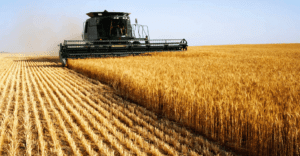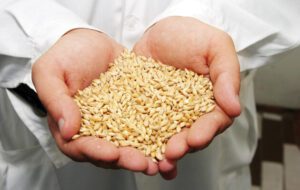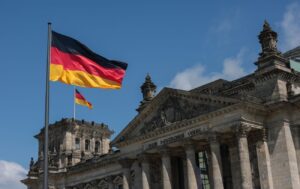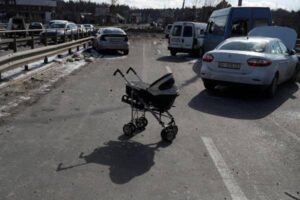
Germany will provide Ukraine with €56 million in financial aid and 350 generators to restore its energy infrastructure, the German government’s press service said after a conversation between Ukrainian President Vladimir Zelensky and German Federal Chancellor Olaf Scholz.
“President Zelensky briefed on the consequences of Russian airstrikes on civilian infrastructure, water and electricity supplies. The Chancellor condemned the ongoing shelling and assured Ukraine of further short-term support. So far, the federal government has provided short-term financial assistance to repair energy infrastructure of about 56 million euros, and Germany is providing more than 350 generators,” the chancellor said in a statement posted on his website Tuesday evening.
In addition, Scholz “confirmed Germany’s continued support for Ukraine, including air defense and long-term reconstruction.”

Germany will support Ukraine’s agricultural sector by the end of this year providing EUR 9 million to buy generators and help restore war-affected farms, while the countries are coordinating a joint EUR 5 million project to develop Ukrainian horticulture.
According to the website of the Ministry of Agrarian Policy and Food on Friday, the German Minister of Agriculture Cem Ozdemir and the head of the Ukrainian Ministry of Agriculture Mykola Solskyi have agreed on the financial aid.
According to the department, Solskyy said that the project is very relevant to Ukraine on the background of the government program, which provides an opportunity to receive a grant for the development of their own horticulture, berry growing and viticulture, and which enjoys great popularity among farmers. Thus, during the five months since its launch grants for more than 240 million UAH have been agreed upon.
In addition, the ministers discussed enhancing cooperation on the Grain from Ukraine food initiative, within the framework of which the United States through its Agency for International Development (USAID) will provide up to $20 million. Solskyy also thanked Germany for being one of the first countries that joined this humanitarian program and funded the transportation of a shipload of grain from Ukraine to Ethiopia.
“Many countries have indicated that they are willing to participate in this program. This is important because of several aspects. First, it is right from the point of view of humanitarian relations in the world. Secondly, Africa needs to know who really cares about it, and because of the actions of which country they are suffering. We are working to make sure that the grain corridor continues to work as long as possible so that we can get our food to where it is needed all the time. And, of course, we will be grateful for the continued support of our partners,” the Ministry of Agrarian Policy quoted Solskyi as saying.

Germany will provide an additional 15 million euros for grain supplies from Ukraine under the World Food Program, German Federal Chancellor Olaf Scholz said, speaking via video link at the .summit on food security in Kiev.
“As we speak, the World Food Program ship sponsored by Germany is on its way to Ethiopia with Ukrainian grain,” he said.
Scholz stressed that “hunger should never be used as a weapon. That is why we cannot tolerate what we are seeing today.”
“We know that by targeting agricultural infrastructure in Ukraine and blockading the Black Sea ports for months, Russia has only made the world’s food situation worse,” he said.
“We have come together to send a clear message – we do not accept Russia’s cynical war. That’s why we are happy to take part in the Graine from Ukraine program,” he said.

Germany will provide another EUR 40 million in humanitarian aid for Ukraine, Minister of State at the Federal Foreign Office of Germany Anna Lührmann has said.
“I also came today to announce that Germany will provide EUR 40 million in humanitarian aid to help this winter. We will also provide an additional EUR 5 million for the reconstruction of Ukrainian schools along with the UNDP,” Lührmann told reporters in Kyiv on Wednesday.
She added that the process of transferring equipment to help during the upcoming winter is already underway, in particular, generators for more than EUR 11 million, which will arrive in Ukraine soon.
Lührmann arrived in Ukraine as part of a delegation of other high-ranking European officials. In particular, Vice-President of the European Parliament Nikola Beer, Federal Minister for the EU and Constitution at the Federal Chancellery of Austria Karoline Edtstadler, State Secretary for Europe of Croatia Andreja Metelko-Zgombić, Minister of Foreign Affairs, Education and Sport of Liechtenstein Dominique Hasler, Parliamentary Secretary of the Ministry Foreign Affairs of Latvia Gunda Reire, Vice Minister of Foreign Affairs of Lithuania Jovita Neliupšienė, and Romanian Foreign Ministry Secretary of State for Global Affairs Daniela Gitman.
Thus, Gitman said that her country would provide EUR 300,000 UNHCR to help the Ukrainian population in winter.
Edtstadler said that Austria has provided Ukraine with the largest humanitarian aid package in history, amounting to more than EUR 92 million.
“In addition, we are providing EUR 100,000 to the International Criminal Court because it is important for me, as a former criminal judge, to ensure an independent investigation of war crimes and to start gathering evidence,” Edtstadler said.
Reire announced that a women’s rehabilitation center in Ivano-Frankivsk, which is partly funded by Latvia, will start operating next week. “It will provide shelter, a wide range of rehabilitation services, legal counseling, psychological assistance to women who are victims of sexual violence,” Reire said.

A climate office will be created in Ukraine as part of the international technical assistance project of the German Federal Ministry of Economics and Climate Protection (BMWK)/EU “Development of Capacity for Climate Action,” said Minister of Environmental Protection and Natural Resources of Ukraine Ruslan Strilets.
“The establishment of the Ukrainian Climate Office is an excellent example of support for Ukraine from our long-standing and reliable partners – BMWK and the EU, which will be implemented by GIZ. I invite all countries seeking to contribute to the overcoming of global warming, to cooperate in the framework of this initiative,” – said the head of the Ministry of Natural Resources at the UN climate conference COP27, the words of which are given in the message of the Ministry in the telegram channel.
They clarified that the official launch of the office took place on Tuesday in the framework of the COP27.
As noted, the project will be co-financed by the EU and the International Climate Initiative (IKI) BMWK, and its goal is to provide real assistance to Ukraine in the implementation of climate goals towards decarbonization.
According to Strilz, the climate office will support the Ukrainian government, cities and regions, as well as enterprises and businesses to implement elements of climate policy.
In addition, it will, in particular, help with the decarbonization of sectors of the economy, with the expansion of opportunities for youth and regions on the way to the EU Green Deal and the implementation of the Paris Agreement provisions.
One of the priorities of its activities will be the development and support of special approaches to climate finance for Ukraine.
At the same time, the report notes that according to the latest estimates of the Ministry of Environment and international experts, additional greenhouse gas emissions caused by military action in Ukraine has already amounted to about 33 million tons of CO2, the largest share of which accounts for more than 23 million tons of CO2.
At the same time, according to preliminary estimates, the recovery will account for approximately 49 million tons of emissions.
At the same time, Strilets stressed that Ukraine has not abandoned for one day its obligations to the world community, including those related to climate policy, and has not abandoned its intention to reduce greenhouse gas emissions by 65% by 2030.

Germany is providing EUR7.6 million to the International Commission on Missing Persons project to help Ukraine find those missing as a result of Russia’s invasion of Ukraine, the German embassy in Ukraine said.
“Germany is providing EUR7.6 million to the International Commission on Missing Persons project to help Ukraine find those missing as a result of Russia’s invasion of Ukraine. Training for Ukrainian forensic experts and investigators is also planned,” the embassy said in a Twitter post Tuesday.Germany to allocate more than EUR 7 million to help Ukraine find war missing – embassy